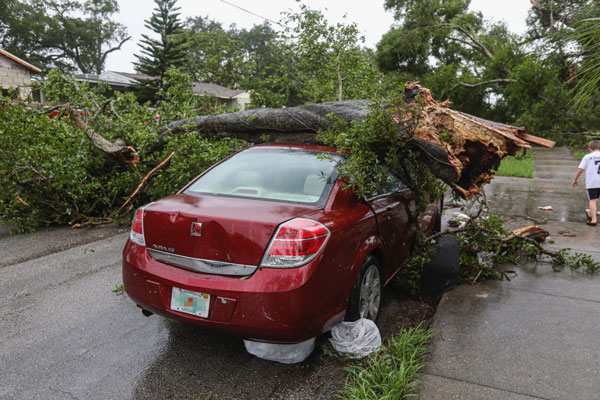When researching low-cost vehicle insurance options, you must be aware of comprehensive collision insurance. However, you may be confused about what it means, what it entails, and how it differs from other similar concepts. We can simplify the process and arm you with the information you need to select the best vehicle insurance policy, including Collision Coverage.
However, the main question here is what constitutes complete car coverage and how to differentiate Comprehensive Vs Collision Insurance. To understand Comprehensive Vs Collision Insurance read this article.
Collision Insurance
Collision coverage is a type of vehicle insurance that compensates the policyholder for destruction to their vehicle caused by the covered driver and is judged to be their responsibility.
Insurance of this sort is commonly purchased as an add-on to a standard vehicle policy to safeguard motorists against financial loss in the case of an accident. It covers paying for the expenses of fixing or substituting your car if it will be damaged in a collision with any other vehicle or an object like a tree or a wall.
Comprehensive Insurance

It protects against financial loss if the vehicle is damaged due to unforeseen events other than crashes, such as theft, hailstorm, or vandalism.
Combining the two types of insurance could help improve matters and give you the finest collision coverage for students. Some situations are covered by comprehensive vehicle insurance but not by collision auto insurance.
Under vehicle leases or car loans, individuals who lease or buy an automobile are typically required to purchase full coverage insurance. Comprehensive collision, as well as liability insurance, are all included in full coverage insurance. Vehicle accidents and other damages suffered by theft, severe weather, or explosion would be covered.
Difference Between Comprehensive and Collision Insurance
Resemblances
- Listed below are some of the commonalities between Comprehensive auto insurance and Collision auto insurance:
- Even though complete and collision coverage are not mandated by law, your lienholder may insist that you have them if you have a loan on your vehicle.
- Collision and comprehensive auto insurance cover help pay for repairs if your vehicle is damaged.
Discrepancies
The question of negligence lies at the heart of the difference between the two main insurance categories. Your collision coverage will cover the costs of repairs to your vehicle if it is damaged in a collision with another vehicle, even if you were not at fault for the collision.
Expenses incurred due to "Acts of Lord/fate" while driving are often covered in full by all-inclusive insurance policies. Some examples of this are a frightened deer, a violent rainstorm, or a carjacking.
Both policies will reimburse you if your car is damaged, but there is a key differential in the causes of that damage.
Comprehensive Insurance Coverage for Damages
- Aspects of the Environment
- Theft
- Burning
- Animal-related destruction
- Floods
- Destruction of car
- Explosion/blast
- Accidental Drops
Comprehensive Assertions
Here are some situations where a full claim might be appropriate:
- If you hit a wild creature, it will likely be fatal.
- The car was destroyed in the garage fire.
- The hailstorm destroyed your automobile.
- Your car has been stolen and has not been located.
Accidental Damages That Are Paid for by Collision Coverage
- You were involved in a collision with a car.
- Your automobile was involved in a collision with another vehicle.
- Your vehicle has been involved in a wall or tree collision.
Collision Assertions
The following situations could be eligible to submit a claim under your collision coverage:
- Your vehicle slides on the snow and crashes into a railing after losing control.
- You steer away from striking an animal but end up colliding with a post instead.
- Someone does damage to your vehicle and then flees the scene.
How does Collision Insurance Operate?
As the name suggests, it compensates the policyholder for losses sustained directly from a collision. Robbery and damage are not compensated for in this plan. Neither does it pay for repairs paid for by the at-fault motorist's insurance.
Collision insurance is essential if you want to avoid the financial hardship that comes with car damage. As a result, collisions are very simple to happen upon. Anyone who is at blame in an accident may also be you.
Cost of Collision Insurance
The comprehensive and collision average car insurance costs per month are premised on similar cost variables as the overall Collision insurance policy. Your insurance company may consider your age, driving record, insurance score, and vehicle type in addition to the above criteria. These considerations will come into play when determining your insurance limitations, premiums, and deductibles.
Factors to Take into Account in Coverage
There's a good chance you're wondering whether you will be needing both kinds of vehicle insurance or not. If you're trying to decide if collision and comprehensive insurances are a must for you, think about the following:
Location
Consider if you live in an area with high rates of automobile accidents and theft, natural disasters, and vandalism.
Vehicle usage
If you spend a lot of time in the car, you increase your risk of being involved in an accident. Therefore, it's best to limit how often you do so.
Location
Consider if you live in a location that is near the region where accident happen very often and car proprietors has to face robbery, adverse environment, or destruction often so you are eligible for coverage.
Use of Vehicle
It would be good for you if you do driving regularly. I.e., you might be involved in a collision if you spend long hours traveling by car.
Value of Vehicle
Your car insurance company would cover the vehicle’s value. You should consider these insurances, especially if you have a new car compared to an old one. Your more unique automobile is probably in better shape and is valued more, plus the replacement parts are usually more costly. Consider an example; When your vehicle is valued at $20,000, you'll qualify for a larger proportion of insurance than if it's valued at $10,000.
Conclusion
Let's say you want to add more protection to your car insurance in the form of Comprehensive or Collision Coverage. In that case, the most appropriate moment to assess and find the relation between comprehensive and collision insurance. You should always look around to find the best possible deal when it comes to insurance.




